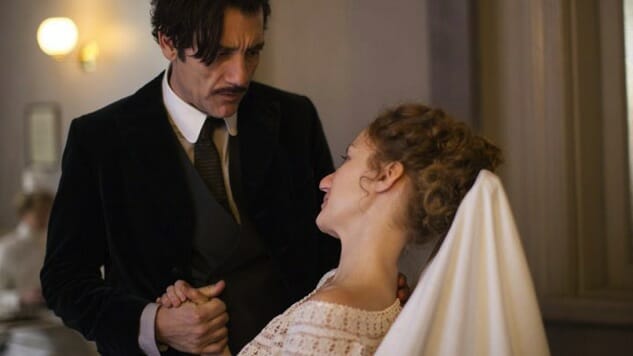The Knick: “Wonderful Surprises”
(Episode 2.04)

It almost seems unfair to the acting and writing of The Knick to keep harping on about Steven Soderbergh’s work behind the camera and the use of the editing software on his laptop. But, as so many people have been pointing out over the past few weeks, and in the months leading up to this second season, this show would be remarkably different—and potentially worse—without it.
I point you to a few key scenes in last night’s episode involving Cornelia for proof. All of them take place with her sitting at a long wooden table. In the first, the camera moves slowly around the room as a gaggle of society women discuss the decorations for some function. It stops near Cornelia as she looks off into the distance, visibly bored and disengaged with the discussion of color coordination. It frames her unspoken emotion that she is technically a part of this world, but completely removed from it. Her ambitions are much grander.
The next time we see her at a table, she is lunching with her parents and, much to her surprise, Algernon and his heretofore hidden wife. As the conversation pleasantly carries on, the camera stays on Cornelia, slowly zooming in as we are forced to focus completely on her despondent face as she realizes that she may have just lost her last, best chance at reconciling with her former lover.
It’s devastating, but not so much as her next dinner engagement with her in-laws. Philip has to tell Cornelia that he’s going to be gone for a month on a business trip. He doesn’t offer this news freely, but is instead instructed to do so by his dad. As the scene progresses, we suddenly realize that we haven’t seen the elder Showalter’s face at all, even though he is the key element of this discussion. Instead, we look only on Philip as he registers his deep understanding that he knows what he’s leaving his wife behind to face, and Cornelia’s poorly masked terror. That expression is even deeper seconds later when the shot gets framed to nearly drown her out by a big black swathe of her father-in-law’s suit.
-

-

-

-

-

-

-

-

-

-

-

-

-

-

-

-

-

-

-

-

-

-

-

-

-

-

-

-

-

-

-

-

-

-

-

-

-

-

-

-








































